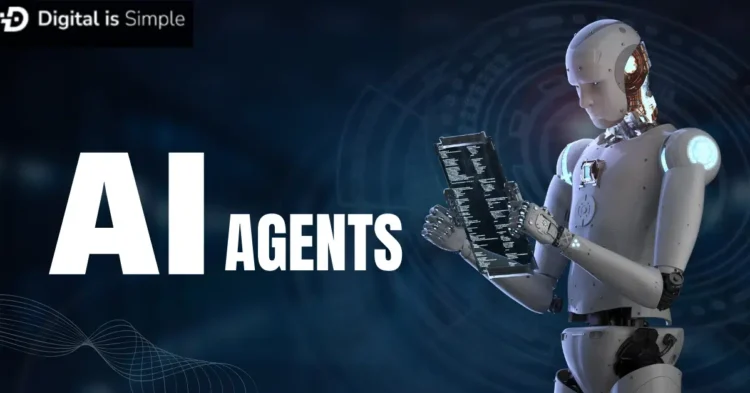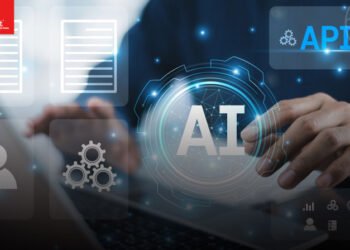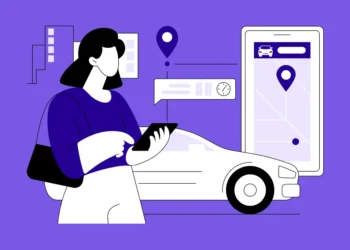AI has been evolving at breakneck speed, and one of its most fascinating developments is the AI agent. You may have heard the term “agent” tossed around in tech conversations. So, why are businesses and industries so eager to use them?
In simple words, an intelligent agent designed to work independently for a bigger goal rather than just following rigid step-by-step instructions. These agents are powered by cutting-edge technologies like Gen AI and large language models (LLMs). Businesses can spin up AI agents for customer service, internal workflows, or more.
In this blog we will explain what AI agents are, their benefits, main types, and real-world examples.
The Role of AI Agents in the Agentic Ecosystem
In the modern agent ecosystem, work is no longer controlled by humans. Instead, it is a well-coordinated cooperation between robots, AI agents, and people. Robots excel in data entry or assembly-line processes such as repetition and high-vantage functions. They are sharp, tireless, and accurate.
The evolution of the AI agent framework led to the completion of target-orientated tasks for adaptability. They can analyze references, adjust strategies, and work towards specific results without continuous supervision. Humans still play the most important role in creativity and fine decisions.
How Do AI Agents Work?

AI agents work step by step — they collect information, think about it, and then take action. Each part has its own role, and together they make the system work smoothly.
Sensors
Sensors collect information from the environment. Whether reading data from an API, scanning user records, analyzing images, or monitoring IoT devices.
This input can be structured like numbers or unstructured (like human speech. The richer and more accurate the data, the better the agent’s decisions will be. You can also get an AI development company for more assistance.
Reasoning Engine
This is the thinking center of the AI agent. It uses ML models to process the upcoming data, identify patterns, make predictions, and determine the best action.
Actuators
Once the decision is taken, the actuators take it out. In software, this means sending an email, updating the CRM dashboard, or processing payment. In many cases, these actuators take the form of an RPA bot.
Magic occurs when these components work together in real time. The sensors gather insight, the logic engine processes them, and actuators execute them.
Benefits of AI Agents for Businesses
Here are the crucial advantages of using Agents in AI.
1. Improved Decision-Making
AI agents can process a heavy dataset in seconds and identify patterns and trends that may take weeks to highlight to humans. This makes quick, accurate decisions, leading to a competitive edge for businesses.
2. Cost Reduction
The need for large teams is reduced by repetitive tasks and automation of resource-intensive tasks. Labor costs decrease, and expensive human errors are minimized. Over time, it creates significant savings.
3. Enhanced Customer Experience
Chatbots, virtual assistants, and automated service platforms provide 24/7 aid. They personalize the reactions, immediately answer questions, and reduce the waiting time, leading to more loyal customers.
4. Scalable Growth
When the workload increases, AI Agents can handle the increase without additional recruitment due to seasonal demand or a sudden increase. This flexibility keeps the operation smooth under pressure.
5. Continuous Improvement
Through machine learning, Agents in AI learn from every interaction. Their accuracy, speed, and effectiveness improve over time, ensuring they deliver more value.
Types of AI Agents

Here are the types of AI agents in constant use.
1. Simple Reflex Agents
These agents act immediately in response to a trigger. They do not store previous information, making them highly approximate and ideal for rules-based tasks. It suits repetitive and rule-based tasks.
2. Model-Based Reflex Agents
Model-Based Reflex agents have a basic understanding of their environment. This allows them to make better decisions than simple reflex agents when facing changing conditions.
3. Goal-Based Agents
They are programmed to achieve a specific objective. They customize their functions based on the path that brings them closer to the target. It aims to adapt some actions for the goals.
4. Utility-Based Agents
Utility-Based Agents weigh different options for choosing the highest gains. They consider the business band, making them valuable to make strategic decisions. You can get AI integration services for more assistance.
5. Learning Agents
These agents improve with experience. They analyze the response from previous tasks and adjust their approach to achieve better results in the future. It improves the overall user interaction and increases engagement rates.
6. Autonomous Agent in AI
Autonomous Agent in AI combine several strategies to operate independently. They handle complex tasks without continuous inspection. It operates independently and combines multiple strategies to complete tasks.
6. Multi-Agent Systems
This agent consist of several agents in AI that work together, often with humans, to achieve shared goals. They handle complex tasks without continuous inspection. Includes human labor to add up intelligence in real-time responses.
How are AI Agents Helping the Industries?
AI agents are transforming different industries by making processes faster, smarter, and more efficient.
1. Customer Support
AI-driven chatbots, virtual assistants, and interactive voice systems immediately handle the User Query. They solve simple issues on the spot, pass complicated issues to human agents, and provide 24/7 availability.
2. Healthcare
AI agents help in diagnosis by analyzing symptoms and medical imaging. They monitor the patients in real time, and when the intervention is required, it alerts doctors. They also automate administrative tasks such as appointment scheduling and billing, saving staff time.
3. Finance
From the detection of fake transactions, AI agents improve security and efficiency in AI. They also provide personalized financial recommendations and automate customer service processes.
4. Manufacturing
The AI agents predict maintenance needs for machinery and reduce downtime. They optimize the distribution routes, adjust inventory levels, and streamline logistics.
5. Telecommunications
AI agents fix self-heal network issues and automatically correct billing errors. And guide customers through troubleshooting without human participation.
6. Government & Public Services
They help citizens navigate public services through virtual assistants. Predictive analytics aids law enforcement and urban planning, improving efficiency and accessibility.
Challenges You May Face in AI Agent Integration
AI agent integration may face serious challenges in the building.
Ethical and Privacy Concerns – AI Agents often process sensitive individual and business data. Without proper safety measures and transparency, misuse or violations can cause damage to trust.
Technical Limitations – Some agents struggle with highly unclear scenarios or require large amounts of data to act effectively.
Integration Issues – The issue may arise when connecting the AI system with the legacy infrastructure. Without a proper plan, the implementation can be slow and expensive.
Bias and Fairness: If AI’s training data is biased, its decisions will reflect that bias. This can lead to improper or discriminatory consequences.
Real World Examples of AI Agents
Here are the real-world uses of Agents AI in the industries.
1. Rational Agent
A rational agent is built to make the best decisions in any situation. For example, in supply chain management, a rational agent can look at inventory levels and transport costs to choose the most efficient delivery route. This helps improve performance and reduce losses. It is very useful in industries because it has a positive effect on revenue and customer satisfaction.
2. Learning Agent
A learning agent improves its performance over time by learning from previous experiences in new situations. Think of an AI-powered sales assistant that studies behavior, adjusts the approach, and tailors the product to individuals it offers. Initially, it can rely on the preset rules, but it interacts more with users for better conversion rates. This continuous education makes it a property for businesses with the aim of staying competitive in markets.
3. Problem-Solving Agent
A problem-solving agent focuses on finding a solution to a specific challenging task. In terms of troubleshooting, an AI problem-solving agent can diagnose system errors and only increase unresolved issues. It reduces downtime, cuts operating costs, and ensures rapid resolution. Businesses often use such agents for complex projects in a systematic approach.
4. Knowledge-Based Agent
A knowledge-based agent depends on a structured database of facts and regulations to make informed decisions. For example, in legal technology, an AI agent may refer to many legal documents, case history, and compliance rules. It acts like a digital specialist, which provides relevant insight in seconds. It speeds up research and reduces oversight, making it a powerful decision-support tool.
5. Utility-Based Agent
A utility-based agent does not target only for purity; This is for the best possible results by weighing preferences and business bandwidth. For example, in an e-commerce pricing system, a utility-based agent can balance the profit margin, competitive pricing, and customer satisfaction to recommend the optimal value point. It evaluates all factors, provides each “utility value” to each, and chooses the action that provides maximum benefits to the business.
The Future of AI Agents
As NLP improves, Agents in AI will become autonomous and comfortable for the end-to-end workflow. We are moving towards a future where they are embedded in almost every commercial process.
This helps teams to work fast, make better decisions, and provide an extraordinary user experience. Intelligent agents are not here to change people. They are here to enhance human abilities to focus on creativity and connection.
Conclusion
AI Agents are more than a technological upgrade; they’re a new way of working. Whether you’re in healthcare, finance, manufacturing, or public service, AI Agents are here to help. They can streamline operations, improve decision-making, and open the door to innovations. To explore these solutions further, you can get support from an AI agent development company for more assistance.
FAQ:
-
How can AI Agents fit into my existing business workflows without disrupting operations?
Absolutely—they can be integrated gradually. Start with automating smaller, repetitive tasks like email filtering, scheduling, or basic customer inquiries. Then scale up to more complex, decision-driven tasks once the AI is trained on your processes. This step-by-step approach ensures smooth adoption with minimal downtime.
-
Will Agents in AI replace my employees?
Not entirely—Agents in AI are here to complement, not replace, human talent. They handle high-volume, repetitive, or data-heavy tasks so your team can focus on creative problem-solving, strategy, and customer relationships. Think of them as “digital colleagues” who never get tired.
-
How do AI Agents impact customer experience in real terms?
By offering instant, 24/7 responses, personalized recommendations, and faster problem resolution. For example, a banking AI agent can answer balance inquiries in seconds, while escalating fraud alerts to a human for immediate action. This means happier customers and stronger brand loyalty.
-
What is the ROI of deploying Intelligent agents in business?
ROI often comes from reduced operational costs, fewer errors, and increased productivity. Businesses also see revenue boosts from improved customer satisfaction and faster response times. For example, one retail brand cut operational costs by 30% after integrating AI-driven inventory agents.
-
How do I ensure my AI Agent make fair and unbiased decisions?
By setting clear governance policies, using diverse and representative training data, and scheduling regular bias audits. Partnering with ethical AI providers and maintaining human oversight ensures your AI remains fair, transparent, and trustworthy.

















